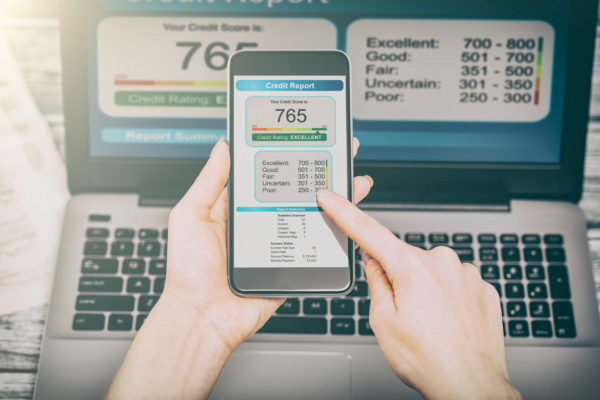
No, you don’t need good credit for a debt consolidation loan, but it definitely helps. Good credit means better loan offers and bigger savings on your debt. Bad credit limits your loan options, and the remaining loans may have such high-interest rates that they aren’t worth it.
This reality can make finding a debt consolidation loan even more difficult and stressful than it has to be. After all, debt consolidation loans help people get out of debt, ideally, but it’s often the people that need the loans the most who cannot get them.
That’s because high levels of debt often cause bad credit. You don’t necessarily need really good credit for a debt consolidation loan, but it helps.
Why does credit affect your ability to get a loan?
A person’s credit score represents his or her level of safety in relation to credit. A high credit score indicates that someone is likely to pay debts back on time and in full. A low credit score indicates a less certain outcome.
A solid payment history is a major part of a person’s score, but it’s not the only factor. Even if someone has kept up with payments, debt levels can still cause his or her credit score to suffer.
How debt affects credit
Debt affects about 30 percent of a person’s credit score calculation. When it comes to debt and credit, two different factors come into play.
The first is the credit utilization ratio. This is the ratio between a person’s accumulated credit balances and the person’s total credit limit. As a rule of thumb, a “good” credit utilization ratio is approximately 30%. The closer someone is to maxing out credit cards, the more unfavorable this ratio becomes.
The second is debt-to-income ratio. This is the ratio between a person’s current debt burden and his or her total income. A “good” debt-to-income ratio is approximately 36%. If a larger portion of a person’s income goes toward paying down debt, it’s likely to affect his or her credit score negatively.
For a person struggling with debt, these ratios are often far beyond what most lenders would qualify as “good.” Since these ratios factor so heavily into credit scoring, that means that a highly indebted individual seeking a loan starts at a disadvantage.
This reality can feel especially cruel for people seeking debt consolidation loans. If a person is seeking a debt consolidation loan in the first place, he or she likely has high levels of debt that current income can’t effectively handle. A debt consolidation loan could help that individual effectively deal with debt, but the negative impact on that person’s credit score makes it extremely difficult to gain approval for the necessary loan.
Still, you don’t always need good credit for a debt consolidation loan. Applicants just need to be extra wary of bad loan offers so they know when to say “no.”
Warning signs of a bad debt consolidation loan
All loans are different, each tailored to the individual borrower. Still, bad debt consolidation loans share a singular quality: they barely save the borrower any money in the end. While it might seem ludicrous that someone would take out a loan that doesn’t do any good, it’s more common than most people think. There are two major reasons why a debt consolidation loan might be bad for a borrower: high interest rates and overly long payment periods.
High interest payments over time
Most debt payments actually go toward paying down interest, not the principal amount of the loan. This dynamic is even more prominent with credit card debt, which tends to carry higher interest rates than most other common forms of debt. To that end, the way that debt consolidation loans usually save borrowers money is by drastically reducing interest rates.
However, there’s no guarantee that a debt consolidation loan will actually reduce the amount that someone pays in interest over time. In fact, lenders tend to raise interest rates on borrowers with bad credit in order to mitigate the risk of lending. This is “risk-based pricing.” Lenders view a bad credit score as a signal that someone might not reliably pay back the money borrowed, so they hedge their bets by charging more in interest.
A high-interest loan may not be readily apparent to the average borrower, especially when it comes to debt consolidation. The loan may improve on some of the borrower’s existing interest rates, making it seem like a better deal than it is. The borrower should be certain of the lifetime cost of the loan before accepting it.
It may be tempting to accept a higher interest loan, especially when other lenders have denied your loan applications due to bad credit. However, no matter how badly you need debt consolidation, you should be wary of any loan that doesn’t significantly reduce interest paid over time. A good debt consolidation loan should save you money, and you should hold out until you can find one.
Long payment periods
Longer loan terms often come with lower monthly payments, which can be a very attractive perk for someone who’s struggling financially. A lower monthly payment may save you money in the short term, but it doesn’t actually guarantee that you’ll save money over time.
In fact, too-long payment periods can actually end up costing more in the end. Longer terms mean more time for the loan to compound interest, potentially increasing the total cost of paying off the debt. A slightly reduced monthly payment is not worth significantly increasing the cost of your debt.
Before accepting an offer for a debt consolidation loan, calculate the cost of the debt over the proposed payment period to make sure you would actually save money in the end.
If you’re struggling with truly bad credit, finding a decent debt consolidation loan can be impossible. In this case, it often pays to work toward improving your credit score now and re-applying for a debt consolidation loan down the road.
How to improve your credit score
Credit scores sum up an individual’s entire credit history into a single, easy-to-understand number. The longer and more checkered that credit history is, the more difficult it is for an individual to improve that credit score in a timely manner. While boosting your credit score quickly isn’t easy, there are clear steps you can take the get the process started.
Know what good credit looks like
Credit scores range from 300 to 850. Knowing what constitutes a “good” score is vital to improving your current score.
Generally, credit scores break down like this:
Excellent: 750+
Good: 700-749
Fair: 650-699
Poor: 600-649
Bad: Below 600
The lower your score, the higher your interest rates are likely to be. People with scores below 600 are unlikely to qualify for debt consolidation loans at all. They’ll also probably struggle to improve their scores anytime soon. Individuals hovering in the 630-699 range, however, may find that it’s worth it to wait and boost their scores before applying for a debt consolidation loan.
Make payments on time
It’s next to impossible to improve your credit score if you aren’t paying your bills on time, especially your credit card bills. Payment history is a huge part of your credit score and, while keeping up with payments won’t fix your credit history overnight, missing payments can wreck it relatively quickly.
Eliminate credit card balances
Paying down credit cards as fast as possible is a great way to improve your credit utilization ratio and your debt-to-income ratio, which both factor heavily into your credit score. Even if you can only afford to pay a small amount over your minimum payment on a single card per month, reducing that balance will help in the end.
Monitor your credit report
You are entitled to a free copy of your credit report from AnnualCreditReport.com once per year. Getting to know your credit score and credit history lets you know where you stand and enables you to dispute any reporting mistakes that might be negatively affecting your score.
Bad credit alternatives to debt consolidation loans
Having bad credit might make securing a debt consolidation loan impossible, but that doesn’t mean that debt relief is out of the question. Outside of debt consolidation, there are plenty of options for debtors looking for help getting out of debt, regardless of their credit scores.
Balance transfers
With a balance transfer, you transfer your debts to a low-interest financial instrument. Usually, this is a credit card with a promotional interest rate. For a set number of months, the card compounds little-to-no interest, giving you time to aggressively pay off your existing debt without worrying about your balance increasing.
Balance transfers are technically a form of debt consolidation. They work best for smaller amounts of credit card debt, but they can be effective in a wide range of circumstances.
To make a balance transfer work, you must be able to pay off a significant amount of your debt before the promotional interest rate ends. Otherwise, you’re simply moving debt from one card to another without making any real progress.
While you likely won’t gain approval for a balance transfer card if your credit is truly abysmal, it’s easier than getting a debt consolidation loan.
Credit counseling
Credit counseling usually happens through a non-profit organization. Non-profit credit counselors are trained professionals who look at your total financial situation to help you find a way out of debt. They may work with you to devise a financial management plan, help you to improve your financial literacy, and even draw up a plan to pay off your debt quickly on your current income.
Often, credit counselors end up devising what’s called a “debt management” plan to help debtors who are struggling with their debt burdens. With debt management, a third-party company works directly with your creditors to renegotiate your debt. Usually, they work to reduce your interest rates and get any accumulated late fees or penalties waived. Then, they draw up a payment schedule that spans 3-5 years. You pay a single monthly payment to the debt management company, which then disburses it to your creditors.
Credit counseling and debt management can help you to get back on track financially without requiring you to take out a new loan or open up a new credit card. On top of that, your creditors should stop calling you to demand repayment once they know that you’re already working with a credit counselor. Since these programs are for individuals who struggle with credit, a bad credit score won’t prevent you from being accepted.
Debt settlement
With debt settlement, the ideal outcome is that you pay your creditors less than you owe. It sounds great, but getting to that point can be a challenge.
In debt settlement, you pay your monthly debt payment to a third-party company that agrees to deal with your creditors on your behalf. Unlike a debt management plan, however, that company does not disburse those funds to your creditors. Instead, it deposits that money into a savings account on your behalf, and you stop paying your creditors entirely.
After a large enough sum has accumulated in the savings account, the debt settlement company approaches your creditors with an offer: take a lump sum payment for a portion of the debt and forgive the rest of it. Creditors, desperate to get some kind of return on their investment, often agree to these terms.
While debt settlement may save you a significant amount of money, it comes with its fair share of risks as well. Ceasing to pay your creditors will only damage your credit score further, making it even harder to get a loan down the road. However, in order to save money and eliminate your debt quickly, the trade-off might be worth it.
Getting to know your debt consolidation options is the first step to effectively eliminating your debt. If you want to learn more, National Debt Relief is your one-stop debt relief resource. Explore your options and contact us when you’re ready to take the next step.





